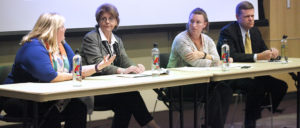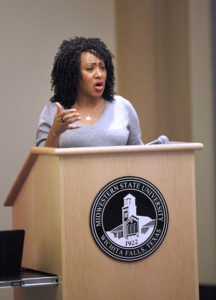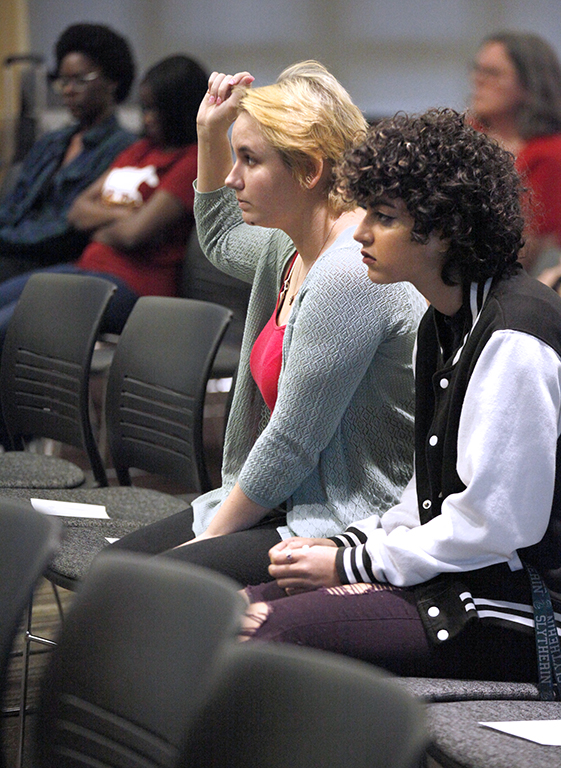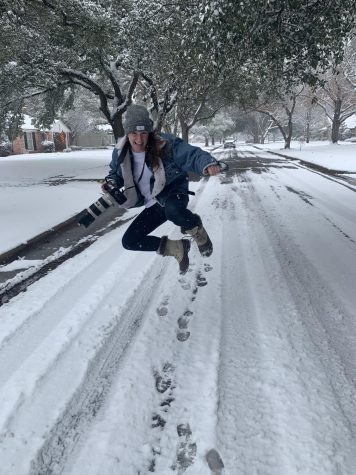
To discuss the results of the campus climate survey that was distributed last spring, the Office of Equity, Inclusion and Multicultural Affairs members hosted the last topic for the Critical Conversations Series on sexual assault Nov. 27 in the Legacy Multipurpose Room at 4 p.m.
In the survey, students reported high perceptions of consent, moderate perceptions of campus safety and overall satisfaction with the institution’s response to campus sexual violence. The data suggested the campus body feels a general sense of support from the institution, but more attention needs to be given to educating individuals on their personal responses to misconduct.
A faculty panel comprised of Andrea Button, assistant professor of sociology, Syreeta Greene, director of equity, inclusion and multicultural affairs, Keith Lamb, vice president for student affairs and enrollment management, Linda Veazey, associate professor of political science, and Debra Dyason, executive director of First Step, discussed the research and focused on the key points from the survey. According to the survey, 17 percent of those on campus have been a victim of sexual violence and with 21.5 percent on the survey, more than twice as many women experience sexual violence on campus compared to men at 9.3 percent.
“The results seem to be in line with what the program was about which is discussing topics that impact the campus community,” Greene said. “For this particular program, Critical Conversation Series, we have addressed or talked about a number of different topics, all topics that impact the students, faculty and staff within the community of the university. It has been a two-year process to get the survey going.”
After receiving the results from the survey, Greene said it was “a great opportunity to discuss the results” at this series, so the series not only handled sexual misconduct, but touched on healthy sexual activity and how to respond to sexual advances.

“This program was beneficial to the series of steps this university has been taking,” Greene said. “Recognizing the data was key to understanding what the issue and prevalence was. By going through the analysis process, we now have the data to begin the conversation about it in the community.”
According to Button, this is the first time the data was released, so the campus has begun to address the issue of sexual assault on campus. Without concrete evidence and data, Button said “you cannot do anything about the campus climate until you start a conversation,” so the first steps for a safer campus comes from asking the students.
“We waited until this particular event to do a public disclosure of what the survey had said, so that is the frontline of it,” Button said. “Until we hear from students, we can’t say what is going on. We needed to have a public forum where we actually say ‘this is the result of the initial survey.’ We started the conversation, and we need to move forward. It’s the first steps in many.”
According to Button, the series and survey will continue for three more years, but in the meantime, Button said she recognizes that sexual assault occurs on every level on a campus and will continue to drive the discussions on sexual assault in whatever way she said.
“I feel as if I have a critical role to play not just as an educator, but someone who is willing to provide that space and promote training,” Button said. “As a faculty member, I have a responsibility to my colleagues as well. We know this is not just about students being victimized — faculty members face this. We have to be brave enough to challenge sexual assault on campus at every level.”

Because the data was campus specific, Devin Osting, radiology sophomore, said the program was beneficial. While the results of campus sexual assault was lower than expected, Osting said it’s still a problem.
“The fact they still happen is bad,” Osting said. “I know the police on campus are getting night watchers to go around and help. I also know they have spoken with the residence house association on campus to patrol at night to make sure everything is fine.”
While patrol efforts help, Button said there are several steps she can personally take to make the campus climate better.
“It’s my job to make sure this message is out there, so there are things I am already doing such as addressing issues of consent and sexual violence,” Button said. “For me, it’s about education, and it also means I am a responsible employee, so if a student discloses to me, the first thing I ask is ‘are you telling this under the recognition that I have to report it?’ If I have a student coming in saying this is what just happened to me, I am required to report that. I hold myself accountable to that. I am going to report it, and from that step, I follow up and make sure that this is actually being addressed.”


















Michael A. Olaya • Nov 28, 2017 at 5:48 PM
“According to Button, this is the first time the data was released, so the campus has begun to address the issue of sexual assault on campus. ”
Is the actual survey data available for download?